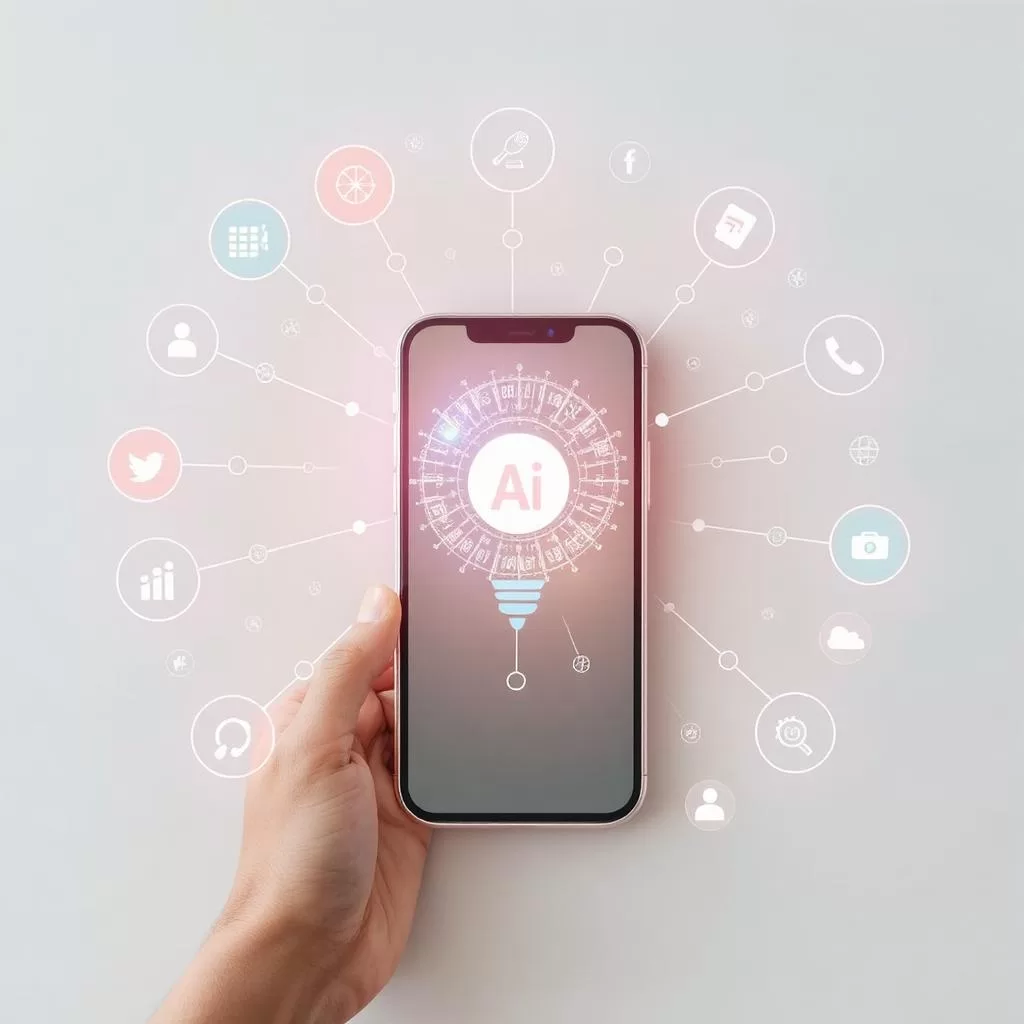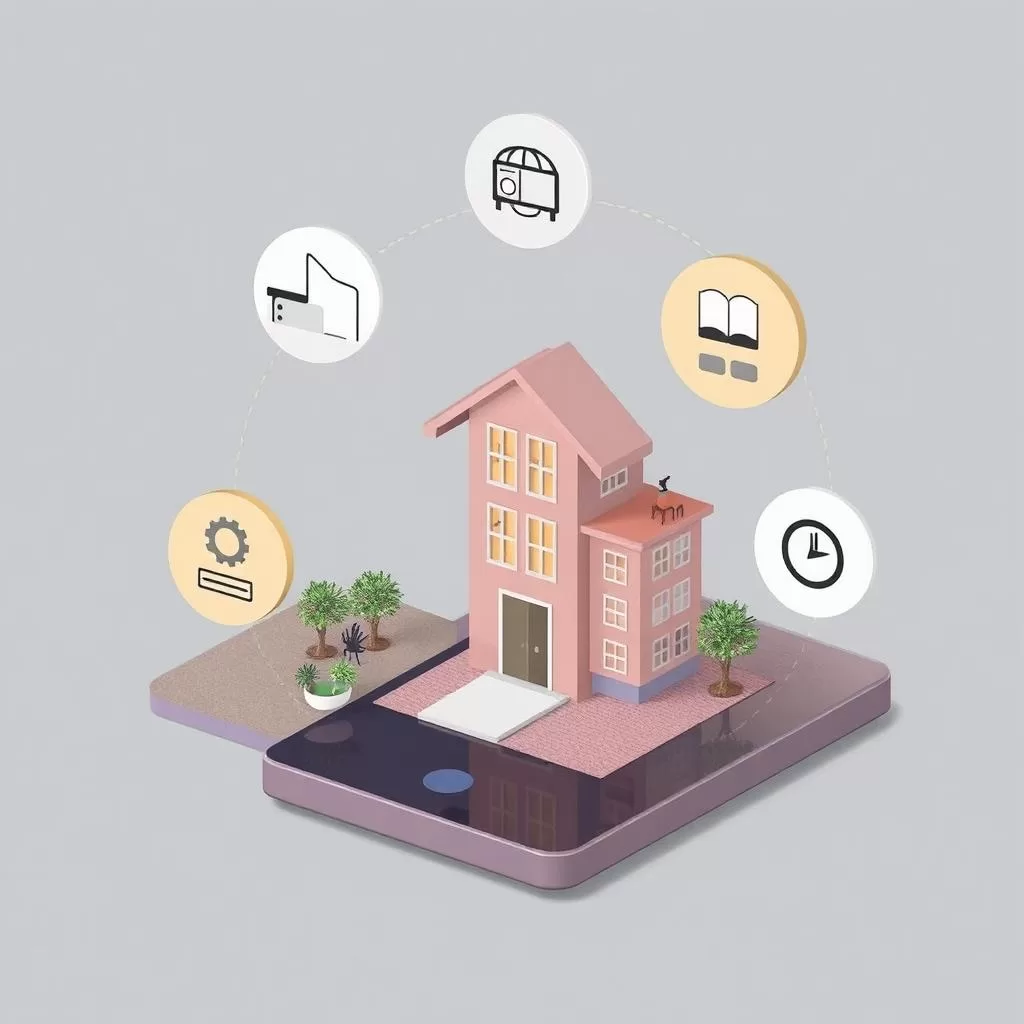AI in Mobile App Development: How it is Revolutionizing it
AI in mobile app development is no longer just a futuristic concept—it’s here, reshaping the entire mobile app landscape. With AI-powered apps, users experience smarter, faster, and more personalized interactions than ever before. From enhancing user experience (UX) to boosting app security, AI is revolutionizing how mobile apps are built, designed, and optimized for efficiency and innovation.
By 2025, AI will power 90% of mobile applications, enabling real-time recommendations, voice assistants, chatbots, and automation.
What You’ll Learn in This Article:
- How AI is improving mobile app development
- The role of AI chatbots, voice assistants, and predictive analytics
- The future of AI-driven mobile applications
AI-Powered Chatbots & Virtual Assistants
AI chatbots are now a must-have feature in mobile apps, providing instant customer support and personalized interactions.
How AI Chatbots Improve Mobile Apps:
AI chatbots are transforming the way mobile apps engage with users, offering a range of powerful benefits that enhance user satisfaction and streamline operations.
✔ 24/7 Customer Support without Human Intervention
With AI chatbots, mobile apps can provide round-the-clock customer support, ensuring that users receive help whenever they need it. This eliminates wait times and reduces the reliance on human agents, making customer service faster and more efficient.
✔ Personalized Responses Based on User Behavior
AI chatbots learn from user interactions and adapt their responses accordingly. This enables the chatbot to provide personalized solutions, enhancing the user experience by offering tailored recommendations, answers, and guidance based on past behaviors or preferences.
✔ Seamless Integration with Voice Assistants
Moreover, AI chatbots can easily integrate with voice assistants like Google Assistant and Siri. This seamless connection allows users to interact with the app through voice commands, making it even more convenient to navigate, request information, or complete tasks hands-free. By combining chatbots with voice interfaces, mobile apps can offer a more intuitive, accessible experience.
🔗 Related: AI in Social Media Marketing
AI in Mobile App Development: Revolutionizing Personalization and User Experience
Artificial Intelligence analyzes user behavior, preferences, and interactions to create customized experiences.
AI Personalization in Mobile Apps:
AI is changing the way mobile apps offer personalized experiences, making interactions more intuitive and user-centered.
- Netflix & Spotify: By analyzing user preferences, AI recommends personalized movies, TV shows, and music playlists. This ensures each user finds content they’ll enjoy without the need for searching.
- E-commerce Apps (Amazon, Shopify): AI tracks past purchases and browsing habits to suggest products that match users’ interests. As a result, shopping becomes more efficient, and conversion rates improve.
- Health & Fitness Apps: AI-powered apps analyze fitness levels and goals to tailor personalized workout routines and diet plans. Consequently, these apps promote better health outcomes and offer continuous motivation.
As AI continues to evolve, these personalized experiences will become even more sophisticated, creating truly unique and engaging app interactions.
💡 Example: AI-driven news apps like Google News curate stories based on reading habits.
AI in Mobile App Security
With cyber threats rising, AI is improving mobile security by detecting fraud, malware, and suspicious activities.
AI-Powered Security Features:
AI is revolutionizing mobile app security by offering advanced, real-time protection against a wide range of cyber threats. Here’s how AI is enhancing security across various industries:
✔ AI-Driven Fraud Detection in Fintech Apps (e.g., PayPal & Stripe): AI algorithms continuously monitor user behavior and detect suspicious activity in real-time. By analyzing transaction patterns, AI can quickly identify anomalies and flag potential fraud before it affects users. Consequently, this provides an added layer of protection for both businesses and consumers, ensuring safer transactions.
✔ Face Recognition & Biometric Authentication in Banking Apps:AI is enhancing banking app security by integrating facial recognition and fingerprint scanning for authentication. These biometric features ensure only authorized individuals can access sensitive financial data. As a result, they reduce the risk of identity theft and unauthorized transactions.
✔ AI-Powered Antivirus Apps for Real-Time Malware Detection: AI-driven antivirus apps provide an extra layer of defense by continuously scanning for threats and detecting malware in real-time. These AI systems learn from new attack patterns, staying ahead of emerging malware strains. As a result, they offer faster and more effective protection compared to traditional antivirus software.
With AI continuously advancing, these security features are becoming more sophisticated, creating a safer mobile environment for users and businesses alike.
🔗 Related: How to Secure Your Online Payments: 10 Essential Tips
AI-Powered Voice Recognition & NLP
AI-driven voice assistants are improving mobile accessibility and user interactions.
🔹 AI Voice Tech in Mobile Apps:
- Google Assistant & Siri: AI enables natural language processing (NLP) for voice commands. Consequently, users can interact more seamlessly with their devices.
- Voice-powered search: Moreover, AI improves accuracy in voice search apps, enhancing the user experience and providing quicker results.
- AI transcription apps: As a result, these apps convert speech into text instantly, making it easier for users to transcribe meetings or notes on-the-go.
💡 For example, AI-based translation apps like Google Translate use NLP for real-time language conversion.
AI in Mobile App Development & Testing
AI is automating mobile app development, reducing manual coding, debugging, and testing time.
As a result, AI is revolutionizing mobile app development, providing developers with powerful tools to create more efficient, user-friendly apps. From automating coding to predicting user behavior, AI is changing the way apps are built, tested, and optimized. Here’s how AI is shaping the future of app development:
✔ AI-Powered Code Generators Automate App Creation:
AI-powered code generators are streamlining the development process by automatically generating code based on specified parameters. This technology lets developers focus on higher-level tasks, like functionality and design, while AI handles repetitive coding. By reducing development time and minimizing human error, AI makes app creation faster and more efficient. This enables developers to create high-quality apps in less time.
✔ Automated Testing Tools Identify Bugs Before Launch:
With AI-driven automated testing tools, developers can identify and fix bugs before launching their app. These tools simulate real-world usage and analyze the app’s performance, detecting bugs, glitches, or inconsistencies early. By automating testing, AI improves app quality and user experience. As a result, the need for manual testing is reduced, accelerating the development cycle and minimizing post-launch issues.
✔ AI-Powered App Analytics Predict User Trends & App Performance:
AI-powered analytics platforms are enhancing app development by providing deep insights into user behavior and app performance. By analyzing data such as user interactions, session lengths, and feature usage, AI can predict future trends. Additionally, it can optimize app functionality and suggest improvements to enhance the user experience. With predictive analytics, app developers can make data-driven decisions to improve user engagement, retention, and overall app success.
As AI continues to evolve, app development will become more automated and intelligent. Consequently, apps will be faster, more reliable, and more personalized for users. Moreover, the integration of AI into every step of the development process is setting the stage for a new era of mobile app innovation.
AI-Powered Image & Video Recognition
AI-driven image and video recognition are transforming social media, healthcare, and e-commerce apps.
AI in Image & Video Analysis:
AI in image and video analysis is revolutionizing industries. It allows machines to interpret visual data with unmatched accuracy. From healthcare to e-commerce and security, AI-powered visual recognition is unlocking powerful capabilities in mobile apps. Here’s how AI in mobile app development is enhancing visual intelligence:
✔ Facial Recognition Apps for Security Authentication
AI-driven facial recognition technology is widely used in mobile apps to enhance security. Apps can now verify a user’s identity by analyzing facial features, making authentication quicker and more secure. For instance, banking apps use facial recognition to protect sensitive data. Likewise, smartphones unlock instantly without passwords, boosting both security and convenience.
✔ AI-Powered E-Commerce Apps for Product Search Using Images
In e-commerce, AI allows users to search for products simply by uploading a photo. Using image recognition, AI can identify items, scan databases, and instantly display matching or similar products. This visual search feature boosts user convenience by turning inspiration into instant shopping. It also increases engagement—especially in fashion and home decor apps—by making product discovery faster and more intuitive.
✔ Medical AI Apps for Disease Detection from Medical Scans
AI in healthcare apps is revolutionizing diagnostics. AI can analyze X-rays, MRIs, or CT scans to detect early signs of diseases. For example, it helps identify cancer, pneumonia, or fractures quickly. As a result, medical AI tools assist doctors in making accurate diagnoses. Moreover, they improve patient outcomes by speeding up detection and reducing human error.
As AI technology advances, image and video analysis will become more accurate. Consequently, adoption will increase across various sectors. This will further enhance the functionality and intelligence of mobile applications in multiple industries.
💡 For example, Google Lens uses AI-powered image recognition to identify objects, places, and products.
AI in Augmented Reality (AR) & Virtual Reality (VR)
AI is enhancing AR & VR applications, making them more interactive and immersive. In addition, the fusion of AI in mobile app development with Augmented Reality (AR) and Virtual Reality (VR) is revolutionizing how users interact with digital environments. Consequently, these technologies are enabling more personalized, intuitive, and intelligent experiences across industries like entertainment, education, retail, and design. Here’s how AI is powering AR/VR features in today’s mobile apps:
✔ AI-Powered AR Filters in Snapchat & Instagram
AI enhances AR filters by using facial recognition and tracking to apply effects in real-time. For example, apps like Snapchat and Instagram leverage AI to detect facial movements and expressions. As a result, filters adjust dynamically, offering more engaging and interactive user experiences.
✔ Virtual Home Design Apps Using AI to Visualize Furniture Placement
Home design apps like IKEA Place use AR and AI to let users virtually place furniture in their rooms. Specifically, AI analyzes room dimensions, lighting, and object placement to provide accurate visualizations. As a result, interior design becomes more efficient and user-friendly, helping users make better design choices with ease.
✔ AI-Driven VR Training Apps for Remote Learning
In VR learning apps, AI personalizes the training process based on user behavior and progress. For example, these apps are used in fields like medicine, manufacturing, and aviation, where realistic simulations help users develop skills in a safe, controlled environment. As a result, they are especially valuable for remote education and upskilling.
As AR/VR hardware becomes more accessible and AI algorithms more advanced, this integration will redefine how mobile apps deliver immersive and intelligent experiences to users worldwide.
AI -Powered Predictive Analytics in Mobile Apps Development
AI uses predictive analytics to improve user engagement, marketing, and business insights.
How AI Predictive Analytics Works in Mobile Apps Development:
In the evolving landscape of AI in mobile app development, predictive analytics plays a crucial role by turning user data into actionable insights. By analyzing past behavior, preferences, and patterns, AI-powered apps can forecast future actions and tailor experiences accordingly. Here’s how this powerful feature is transforming key industries:
✔ E-commerce Apps:
AI algorithms track user behavior—such as browsing history, previous purchases, and time spent on products—to predict what customers are likely to buy next. As a result, users receive timely, personalized product recommendations and exclusive offers, increasing engagement and conversions.
✔ Finance Apps:
AI in financial apps analyzes real-time market data and historical trends to forecast stock movements and currency fluctuations. As a result, this empowers users, especially investors and traders, to make smarter financial decisions with predictive insights and risk assessments.
✔ Health & Wellness Apps:
By reviewing data such as fitness activity, diet logs, and previous health conditions, AI predicts potential health risks. For example, apps can warn users about the likelihood of diabetes, heart disease, or stress-related conditions, and suggest preventive measures or wellness plans.
💡 For example, AI-powered fitness apps analyze workout data to suggest better training programs.
AI-Powered Smart Assistants in Fintech Apps
Fintech apps are leveraging AI for smart financial management.
🔹 AI in Fintech Mobile Apps:
The integration of AI in mobile app development, especially within the fintech sector, is transforming how users manage money, invest, and stay secure. These intelligent features make financial services more efficient, personalized, and accessible to everyday users. Here’s how AI is shaping the future of fintech mobile apps:
✔ AI-Driven Budgeting Apps
Apps like Mint and You Need A Budget (YNAB) use AI to automatically categorize expenses, track spending patterns, and generate budgeting insights. As a result, users gain real-time visibility into their finances and receive personalized tips to save more effectively.
✔ Robo-Advisors for Smart Investing
Platforms such as Betterment and Wealthfront use AI algorithms to manage investment portfolios without the need for human brokers. These robo-advisors assess financial goals, risk tolerance, and market data to optimize asset allocation—making wealth management more accessible and cost-effective.
✔ AI Fraud Detection & Security
Fintech apps like PayPal and Stripe rely on AI-powered systems to detect unusual activity and flag suspicious transactions instantly. By learning from behavioral data, these systems can block fraudulent payments in real-time, protecting users from scams and identity theft.
AI and IoT Integration in Mobile Apps
AI-powered Internet of Things (IoT) apps are transforming smart devices, from home automation to healthcare.
🔹 AI & IoT in Mobile Apps:
The fusion of AI in mobile app development and the Internet of Things (IoT) is creating smarter, more connected experiences. These innovations are reshaping how users interact with their homes, their health, and the world around them—right from their smartphones.
✔ Smart Home Automation
Mobile apps like Google Home and Amazon Alexa use AI to automate home functions. Users can control lighting, temperature, and security systems with voice commands or predictive settings based on usage patterns—making homes more energy-efficient and responsive.
✔ AI-Powered Wearable Devices
Wearables such as Fitbit, Apple Watch, and Oura Ring use AI to interpret data from IoT sensors. These devices monitor heart rate, sleep cycles, activity levels, and even detect stress—offering real-time health insights and personalized wellness advice.
✔ Smart Logistics and Fleet Management
In logistics apps, AI and IoT combine to provide real-time fleet tracking, predictive maintenance alerts, and optimized route planning. As a result, platforms like Fleet Complete and KeepTruckin use AI to analyze large volumes of sensor data. This helps businesses reduce delays, save fuel, and improve supply chain efficiency.
💡 For example, Tesla’s AI-powered self-driving cars rely on IoT and AI for real-time navigation.
Conclusion The Future of AI in Mobile Apps Development
In conclusion, AI will continue to revolutionize mobile apps by enabling:
- Hyper-personalized app experiences
- AI-powered automation & smart assistants
- Enhanced app security & fraud detection
Key Takeaways in incorporating AI in Mobile Apps Development:
- AI is improving mobile app performance, security, and user experience.
- AI-driven chatbots, personalization, and predictive analytics are shaping app development.
- The future of mobile apps will be AI-first, voice-powered, and automation-driven.
💬 What AI feature do you want in mobile apps? Share your thoughts in the comments!
Share this content:







Post Comment